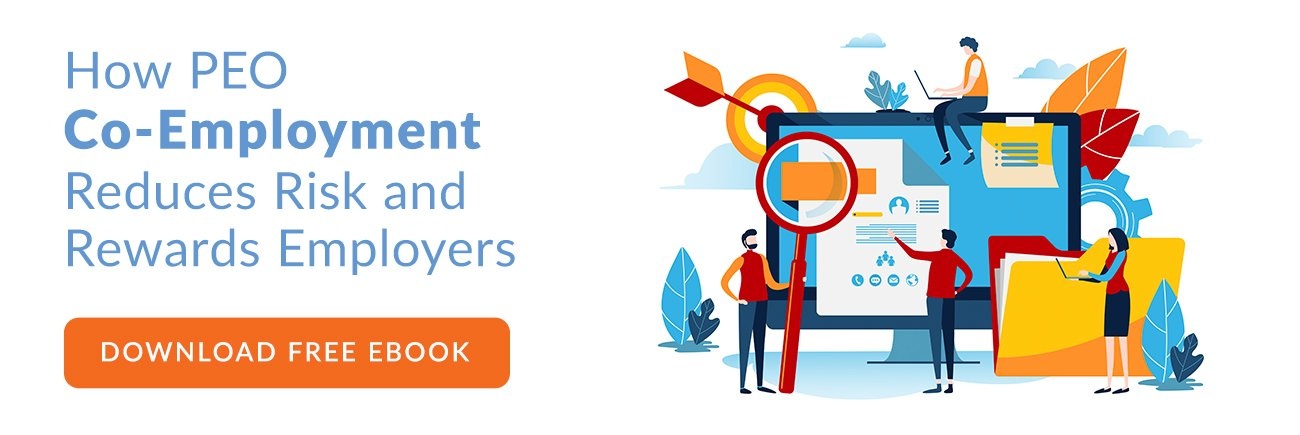Companies unfamiliar with HR outsourcing may question the value of it. However, tangible gains come from working with a Professional Employer Organization (PEO). While ignoring HR outsourcing may not show up on your bottom line as lost revenue or saved costs, there are very real opportunity costs.
What is an Opportunity Cost?
The basic definition of an opportunity cost relates to the benefits you miss out on by choosing one alternative over another. For example, not choosing to advertise on a specific online platform that would give you a good ROI is an opportunity cost.
Opportunity costs are often talked about by economists, and they are something you should consider with every decision you make. You can calculate your opportunity cost simply by comparing the return on investment of one option over another. The average ROI of using a PEO is about 27%.
One reason for this high ROI is that PEOs can use a legal mechanism called "co-employment."
The Advantages of Co-Employment
Co-employment is often poorly understood. It may be confused with joint employment (where an employee's time is shared between two or more organizations). Under a co-employment agreement, the PEO becomes employer of record, which legally allows them to file payroll taxes and provide benefits and workers' compensation. However, they don't control hiring, firing, work hours, or other managerial duties. While a PEO may assist in your hiring and onboarding, the decision of who to hire remains yours.
A major advantage of co-employment is that PEO clients can access the PEO's master benefits plan. Thanks to economies of scale, the PEO can provide benefits that are cheaper than what you could get by yourself. The same mechanism applies to workers' compensation insurance and 401(k) retirement plans. By using their workers' comp, you improve your experience modifier rate substantially and avoid large premium hikes after a claim.
The Opportunity Cost of Lacking a PEO
So, here are some of the opportunity costs you will face if you do not go with a PEO.
No Co-Employment Discounts
As already mentioned, co-employment gives you access to the PEO's healthcare, retirement, and workers' comp. This means that you will be paying more for worse benefits and also handling the administration yourself. This can cost a lot more in employee time, especially if it ends up being delegated to non-HR employees.
Lost Productivity
Low productivity means higher labor costs. Your employees' salaries are a major cost. If you have to hire an extra person because of low productivity the costs are substantial.
On top of that, not working with a PEO means that your HR team will be spending time on tasks they are not experts at, like payroll and benefits administration. A PEO's experts can get these tasks done more efficiently, faster, and with fewer mistakes. If you don't have a HR team then these tasks end up being done by people who have other jobs.
Business owners and HR lose the ability to focus on core competencies and growing the company.
Non-Compliance
Failure to comply with complicated HR rules and regulations can have expensive results. In extreme cases, somebody could end up facing criminal charges. The only people who benefit from compliance mistakes are lawyers.
A lot of mistakes are entirely unintentional. Perhaps the wrong rate of pay was entered, resulting in overtime being underpaid and then you have to pay a lot in back wages suddenly. Alternatively, you may have workers in more than one state, and workers in one state are entitled to paid leave not granted to others.
Those are just some of the fines that come from violating the Fair Labor Standards Act and the Family and Medical Leave Act. Entire books can (and have) been written to address all relevant federal, state, and local regulations.
Increased Turnover
While your HR team is spending time entering payroll taxes, they are not working on the things which keep employees around. HR's primary focus should be on creating a great company culture and offering benefits that attract and keep top talent.
When you can't afford competitive benefits, your best employees will be headhunted by those who can.
When you don't have a good company culture, employees become dissatisfied, more open to other offers, and more inclined to quit.
Increased turnover leads to hiring costs (about $4,129 per hire not counting training and lost productivity as an employee gets up to speed). It also costs you institutional memory when key employees leave and take their knowledge with them.
All of these opportunity costs make working with a PEO too good a deal for smaller companies to pass up. There is a fantastic amount of value here that many companies miss.
Will yours?



